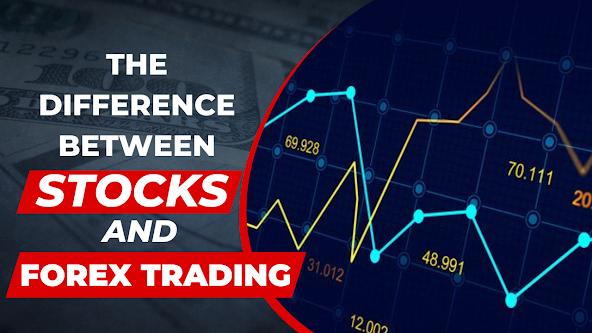THE DIFFERENCE BETWEEN STOCKS AND FOREX TRADING
STOCKS TRADING:-
stock trading involves buying and selling shares in companies in an effort to make money on daily changes in price. A stock trader or equity trader also known as the share trader and stock investor.
FOREX TRADING: -
The foreign exchange [also known as forex or FX] market is a global marketplace for exchanging one currency to another. It stands as exchange of national currencies. This is because it reaches trade, commerce and finance.
WHICH IS BETTER FOREX TRADING OR STOCK TRADING?
It is clear that trading in the forex market has many incentives as compare to the stock market, which makes it suitable for a larger group of people due to its flexible hours, lower fees and higher trading volume. Forex markets are also less volatile than stock markets.
THE STOCK AND FOREX TRADING IS AS FOLLOWS AS:-
MARKET TRADING HOURS
VOLUME OF ASSETS
VOLATILITY AND LIQUIDITY
MARGIN RATES
TRADING STRATEGIES
1. MARKET TRADING HOURS: -
The forex market is open 24 hours a day during weekdays but closes on weekends. With time zone changes, the weekend gets squeezed. This is because foreign currencies are in high demand, discover the forex trading hours.
Whereas, trade in the stock market can only be undertaken during a specific time interval in India. Retail customers have to perform such transactions through a brokerage agency. A trading session is the primary trading hours and locale for a given assets.
2. VOLUME OF ASSETS:-
In forex market, the volume of the forex trading products is the amount of a particular asset traded over a period of time. It is the number of units, shares or contracts that change hands between a buyer and a seller. The more actively traded on asset is the higher volume will be rise.
On the other hand, volume is defined as the amount of an asset or security that changes hands over some period of time, often over the course of a day.
3. VOLATILITY AND LIQUIDITY: -
Generally, when the share market rises and falls more than one percent in a day. Liquidity defines as the ease at which an asset can be converted to cash at its fair value or market 4567price. It is spectrum of liquidity.
An oppose to it, volatility is the rate at which the price of a stock market increase or decreases over a particular period higher stock price. Volatility means higher risk occurs and helps a trader to estimate the fluctuations that may happen in the future. Liquidity generally refers to how easily or quickly a security can be bid or ask a secondary market. Liquidity can be sold readily and without paying a fee to get money.
4. MARGIN RATES: -
Margin means trading with leverage, which can increase risk and potential returns. IN forex markets, 1% margin is not unusual; this explains that traders can control$100,000 of currency with $1000 .
On the other hand, margin in trading is the deposit required to open and maintain a leveraged positions using products to such as CFDs and spread bets. When trading on margin, full market exposure transacts the currency in the stocks trading platform. Each brokerage can set the margin rate differently in the market.
5.TRADING STRATEGIES:-
A forex trading strategy is a technique used by a forex trader to determine whether to buy or sell a currency pair at any given time. Forex trading strategies can be based on technical analysis or fundamental news –based events. Forex trading strategies includes- scalping, day trading and swing trading also.
Whereas, a trading strategy is a systematic methodology used for buying in the securities markets. A trading strategy is based on predefined rules and criteria that used when making trading decisions. A trading strategy may be simple or complex and involve considerations such as investment style.




Comments
Post a Comment